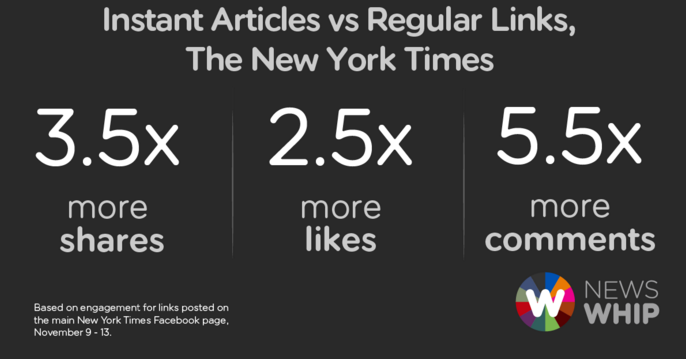How Facebook Inc (FB) Locked 70 Publishers Into Creating Even More Mobile Alerts

In 2014, the world was hardly clamoring for another messaging service, and yet Facebook launched "Messenger" as a standalone app. Similarly, Facebook launched a news app earlier this week -- Notify -- in a world of Flipboard, Apple News and its own newsreader, Paper.
Notify is a standalone mobile app that delivers push notifications to a user’s smartphone based on channels to which they subscribe. Initially, it was seen as a breaking news app, but several launch partners contacted by International Business Times say they're taking a different approach with long reads, features and explainers over hard news.
So far, about 70 publishers have signed onto the system, and each partner can run a number of so-called stations. For example, the Washington Post created ten -- four focused on D.C.-related news and information -- and the New York Times offers 11 stations on what it refers to as “lifestyle content.”
.@washingtonpost is on @facebook Notify: https://t.co/8Kp4UL58QO
— Washington Post PR (@WashPostPR) November 11, 2015Notify is just the latest in a series of Facebook’s new offerings for media. That partnership originates from news outlets creating Facebook Pages and sharing their content; that format is under pressure.
For example, the top 30 publishers on Facebook’s traffic fell by 32 percent from January to October, according to data from SimpleReach, first surfaced by Digiday. Readers are now less likely to click through from a shared article and be directed to a third-party website -- the latter could in part be due to Facebook’s Instant Article initiative.
But some outlets are neither worried nor surprised. “Sure, we do see referral traffic go up and down over time and engagement go up and down over time. Facebook is its own business. It's a partner. They make decisions,” Meredith Artley, editor in chief of CNN Digital, told IBT. “Sometimes we understand why they make them. Sometimes we don’t. But we don’t put all our eggs in one basket.”
Moving Fast, With Facebook
However, these same news organizations are adding more partnerships with Facebook. Since Facebook’s team first approached newsrooms in August with the idea of a breaking news app, publishers have strategized content, investing their time and manpower, and engaging in many back-and-forths with the social network.
“At the time we were hot and heavy with them on Instant Articles,” Cory Haik, the Washington Post’s executive director for emerging news products, said. “Then they told us about this new product … [Notify] sounded exactly what we needed to experiment with a more personalized push [notification].”
The saying goes, “Move fast and break things.” And while some have questioned a reliance on Facebook and issued warnings regarding the social network manipulating readers and bullying the media, news publishers are coming back with confidence about their own needs to experiment and that follows with testing on and with Facebook.
Just as Notify is an experiment for Facebook, publishers are treating it as one for themselves. And it’s a test that comes with data and analytics -- for both Facebook and media. “We'll get instant feedback on these push notifications on what's working and what isn't. That's very exciting for us from an experimental perspective,” Mashable's Social Projects Manager Ryan Lytle, who oversees 10 Notify stations, wrote in an email.
The Pros Of Notify
Facebook Notify has been referred to by some outlets as a “breaking news” app. But in fact, many of the publishing partners, called sources by Facebook, are not breaking news organizations nor are many of the traditional players leveraging the app for such urgent content -- at least not yet.
“We didn’t go for the straight breaking news. We didn’t know what the NYTimes or CNN would do,” the Washington Post’s Haik said. “”We’re setup to do explainers. We provide what’s coming next and why it matters. Our expertise mixed with speed.”
The New York Times also chose not to pursue breaking news, yet. It’s an “experiment for lifestyle content,” the company said in a statement. Mashable decided to highlight its content beyond its focus on tech and startup. Its stations include “Nom Nom Nom” for cooking-related topics and “ ¯_(ツ)_/¯” for weird news.
CNN, however, strategized around breaking news, even while having its own “successful” mobile app that offers push notification on breaking stories. “Notify aligns with CNN’s core breaking news promise so we thought that was a natural fit. We didn’t jump on Instant Articles. That felt less urgent for us. Notify was something we wanted to do, and we wanted to do it well,” CNN’s Artley said.
“Our app is good. It's one of the stronger, most popular news apps in the market. But Notify is Notify, and it's connected to Facebook,” she said.
Because Facebook
CNN and the Washington Post -- along with nearly every traditional news and new media organization -- have been working on ways to put their content in front of readers. "Publishing off-site is a huge strategic move for us. The ultimate goal is we want to be where the audience is,” Artley said.
These tests include creating their own mobile apps and signing on to new initiatives. For instance, the Washington Post created an Apple Watch app to which she said the majority of use and the deepest engagement comes from push notifications. They also use Apple News.
“Our content looks really beautiful there. It’s a nice place for us to expand and to grow new audiences,” Haik said. “We think the risk is naught. You can’t really know what it’s about until you try.”
Even with popular news readers like Flipboard and now Apple News and Twitter, once seen as the go-to destination for sharing news, publishers are embedding deeper into Facebook. Not every traffic statistic is damaging. According to a study by social media tracking company NewsWhip, 20 Instant Articles published by the New York Times from Nov. 9-12 had a higher engagement, on average, than traditional links.

“They were shared over 3.5 times more, liked over twice as much and commented on almost five and a half times more than the regular links,” Liam Corcoran, NewsWhip’s head of communications, wrote.
“My hypothesis is that it’s easier to comment on a story when you read it first. When you’re doing that on the website, the case of you going back to the News Feed and leave a Facebook comment is rare,” Corcoran told IBT.
Notify now furthers that engagement and allows app users to share content directly to Facebook. For managing Notify, Haik said that the daily workload is similar to sending a tweet.
© Copyright IBTimes 2024. All rights reserved.





















